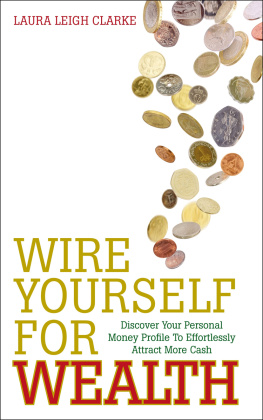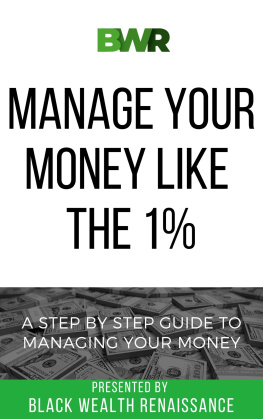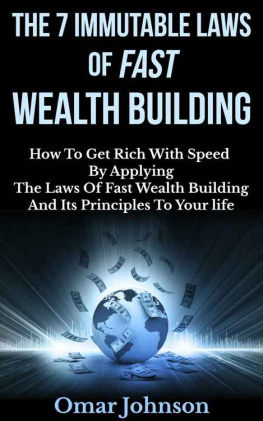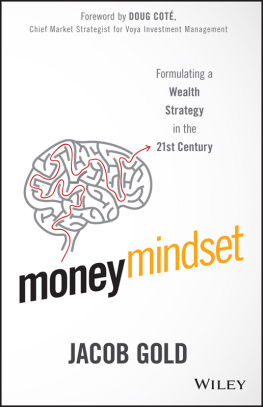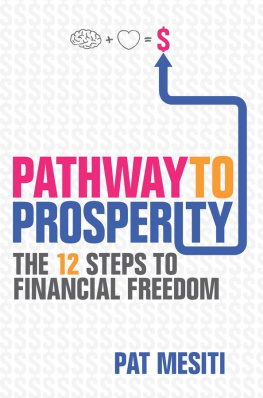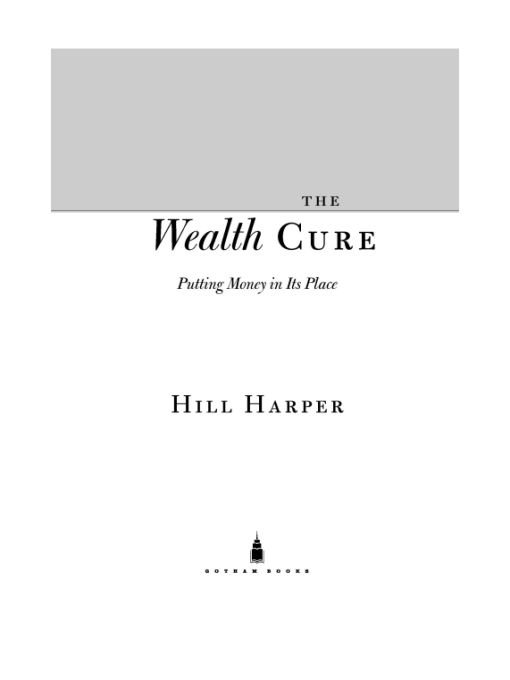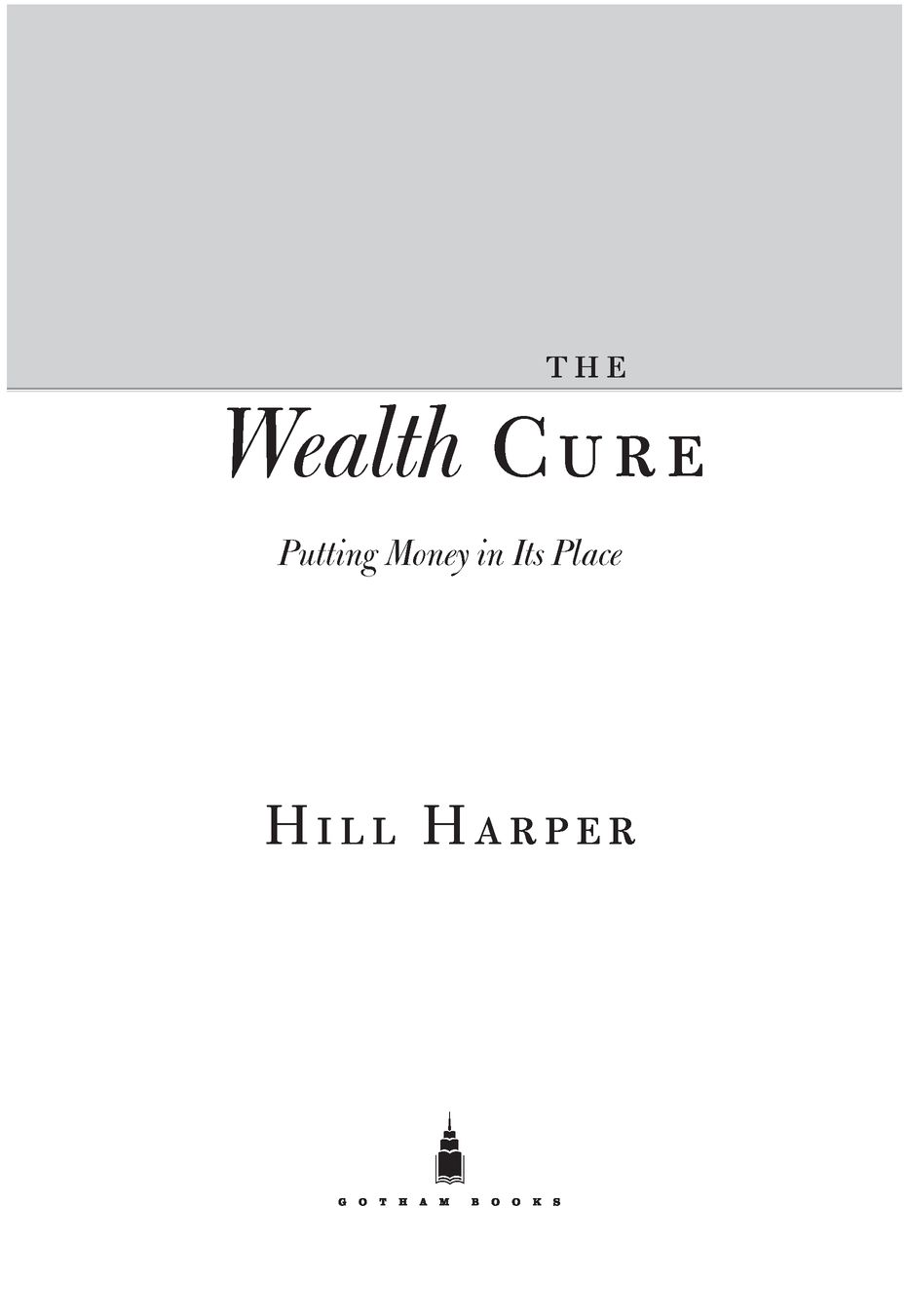Table of Contents
This book is dedicated to a dear friend I know very well and to thousands of men and women I do not know but respect a great deal.
First, to my friend Tracey who was recently diagnosed with breast cancer. Tracey, I love you and Im praying for you.
And second, to the men and women of the U.S. Armed Forces. You are heroes, and I thank you for serving our country and fighting for our freedom. God bless our troops.
The search for love and the search for wealth are always the two best stories. But while a love story is timeless, the story of a quest for wealth, given enough time, will always seem like the vain pursuit of a mirage.
Mark Kurlansky, Salt
PROLOGUE
PUTTING MONEY IN ITS PLACE
The most creative people on the planet are those who frame the biggest, hardest questions and then gather the resources necessary to find the answers.
Rob Brezsny, American astrologer,
writer, poet, and musician
Wealth. To most of us this doesnt sound like something we need to be cured of, right? In fact, most people would love to get infected with a wealth virus. I am not suggesting that wealth is a sickness. Rather, I believe that weas a culture and as individualsmust reexamine, alter, and then cure what has become a debilitating relationship with money and wealth.
Our society is addicted to debt, and, exacerbating that problem, we live in a culture that associates material objectsblingwith success. Those two factors have led us to overvalue money. So much so that in many ways we chase paper just as intently as substance addicts chase their next fix. Our relationship with money borders upon addiction, and so many of the problems we see today, individually and collectively, are the result of this craving. We make irrational and often destructive choices because we have given money and its pursuit too much value.
I thought I understood the meaning of wealth. When I was a kid I saw a Mad magazine cartoon of a man holding a sign that said, MONEY IS THE ROOT OF ALL EVIL. And right behind him stood another man, holding an almost identical sign with just a slight adjustment in wording and a drastic adjustment in message: THE LACK OF MONEY IS THE ROOT OF ALL EVIL.
Now dont get me wrong; Im not saying money is not important. Of course it is. Lets be real. We need it to acquire goods and services; its the compensation we receive for our labor and ingenuity. Money also enables us to take care of loved ones, be charitable with the less fortunate, invest in people, or simply throw crazy fun parties. Its easy to see how many of us came to believe that money equals happiness. But money is not wealth. This is a book about money and wellness. I believe that money plus wellness equals wealth.
In early 2010, I began writing a book about money and financial literacy. Since so many people I met were struggling with issues related to their personal finances, I thought it would be a valuable topic to explore. Oftentimes I choose to write about issues that I personally want (and need) to understand better. But what started out as a very straightforward book about budgeting, savings, and debt evolved as the result of a life-changing experience in July of 2010.
As so often happens when you start out on one life path, unforeseen events affect the route you end up taking. Sometimes you get a short cut, other times a detour that takes you way, way out of your way. For me, the unexpected came in the form of a parallel path, one that brought me to the same point but that offered unexpected scenery and in many ways changed the way I looked at life around me.
A sudden and unexpected health crisis became the background against the book I was writing about money. And as I thought about the physical challenges I faced and how in many ways they paralleled the challenges we all face when it comes to our financial health, I realized that the roadmap to physical well-being was much like the one to financial well-being: from health cure to Wealth Cure.
Health and healing concerns come naturally to me and it may be genetic since so many family members on both sides are deeply rooted in medical fields. On my fathers side I count at least six Harper healers. My grandfather, Harry Harper, a general practitioner who focused on obstetrics; his two brothers, also general practice physicians; another brother who was a dentist; my dad, Harry D. Harper Jr., a psychiatrist who guided patients toward mental health; my Uncle Frank, a family practice physician devoted to promoting health for his patients entire family circle.
The Hills (my mothers side) medical interests started with my grandfather, Harold Hill, a pharmacist who provided medicines and advice to his clients. My mother, Marilyn Hill Harper, practiced anesthesiology, spending her days ensuring that surgical patients moved safely through their procedures to recovery. My first cousin Joe Pinckney is a family practice physician who directs a clinic for underserved populations in North Carolina. From all these health-oriented relatives, I learned that a series of steps is required to facilitate healing and I adapted these strategies to wealth management. These are the Wealth Cure stages: Diagnose / Treat / Comply / Maintain / Thrive.
The first step in assessing the health of your wealth is to do what you would with your body: get a physical, have it checked out to make sure everything is working as it should, at its optimal level. For most of us, theres bound to be something that needs adjustingeither minor or major. A DIAGNOSIS of your fiscal health is the first step on the road to a Wealth Cure.
Any diagnosis should be followed by a second opinion to help develop TREATMENT OPTIONS. When it comes to health, there are many experts, all with different sets of experience and with different perspectives. Its true with money, too. Maybe even more true! Everyone you knowfrom your brother-in-laws financial advisor to your motherhas something to say about money. Not all of it is right or good for you, but sorting through their perspectives and pulling together a team you trust is a must for long term financial health.
Once youve gathered all the information you need, the next step is compliance with THE TREATMENT PLAN. Its one thing to buy that treadmill, its another to get on it every day and work on your cardiac health. And so it is with your financial health: having a great plan isnt worth much if you dont stick to it.
Anyone whos worked to lose that extra twenty pounds will tell you they feel great once theyve hit their goal. Theyll also probably tell you that staying at that target weight takes as much effort as getting there. Paring back your credit card debt is a great way to cut your expenses and get your financial ship righted. The hard part is resisting the temptation to run up the next bill now that youre out from under a cloud of debt. So MAINTAINING YOUR HEALTH AND WEALTH is vital to long term well-being, whether physical or financial. Ultimately, all of this is to THRIVE AND SURVIVE.
I give speeches all over this country and many of the people I speak with these days say they feel exhausted, overwhelmed, and even defeated when it comes to money and personal finance. Why are so many people discouraged? Is it the decimated real estate market? Is it the financial meltdown that erased life savings? Or is it taxes, the deficit, health care premiums, rent or mortgage payments, high unemployment, or credit card debt? The most important question is, do we have the education and tools to effectively manage our money and our life choices?


